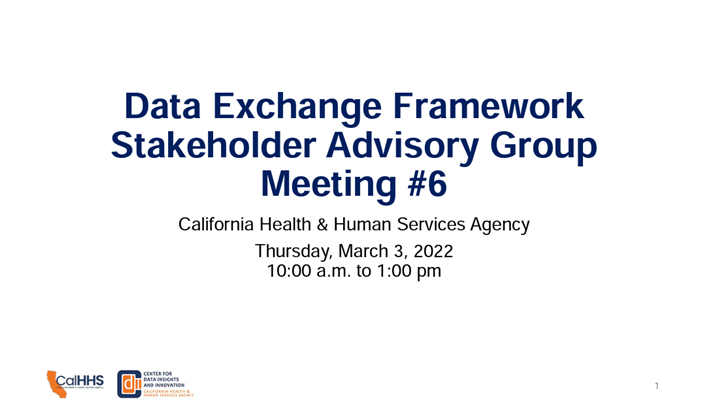
Data Exchange Framework Stakeholder Advisory Group Meeting #6
“Do’s and Don’ts” to advance data sharing in California
At the March meeting of the Data Exchange Framework (DxF) Stakeholder Advisory Group, the California Health and Humans Services Agency (CalHHS) presented a proposed governance model for overseeing DxF implementation. Manifest MedEx joined other Advisory Group members urging clarity on the data sharing agreement (DSA) and needed public investment in data infrastructure, before diving into governance.
For Manifest MedEx, the meeting surfaced several “do’s and don’ts” that echo our recent letter of concerns to CalHHS on the draft DSA.
The “Do’s”:
Do release the entire DSA draft to the Advisory Group ASAP
The Advisory Group should have an opportunity to review the complete draft DSA and suggest edits to the agreement and related policies and procedures before they are released publicly.
While CalHHS committed to presenting the Advisory Group with a “full DSA review” by mid-May, that is too close to the July 1 deadline for the group to provide thoughtful input and engage in meaningful discussion with CalHHS.
Do simplify compliance and reduce the burden of exchange by designating qualified intermediaries
One critical but still-unknown aspect of the DSA is the extent to which the agreement will provide a clear pathway for providers to select a qualified intermediary as their data sharing partner.
Most providers lack the bandwidth to directly recognize, review, and respond to every data request that comes their way. They need to entrust this responsibility to an intermediary equipped to share information on their behalf.
“We need a way to allow [providers] to pick their partner and not require that the organization satisfy the thousands of ways different people want to exchange data…we need to be super explicit about that.”
— Claudia Williams, Manifest MedEx
“Let’s say there is a set of networks in California, and they’re connected with each other…[health care organizations] should be able to say…[we] can connect these networks…and [allow] that to count at the end of the day. What you want is that all those entities can just exchange with each other.”
— Micky Tripathi, Office of the National Coordinator
Do clearly define the data sharing requirements and how they will be enforced
The agreement and the related binding policies should clearly define the data sharing requirements for all entities covered by AB 133. The language should include sufficient detail so that each entity knows exactly what it needs to do to comply, including obligations to proactively send data and respond to queries, deadlines for compliance, consequences for non-compliance, and details on what data types/formats are required. Murkiness on these requirements will slow implementation, reduce the impact of the law, and make enforcement impossible.
“Data sharing requirements should include both query elements (querying for patient CCDA) and push elements (proactively sharing notifications based on ADTs). Networks would need to be able to support both functions.”
— Claudia Williams, Manifest MedEx
CalHHS or another designated government agency should be charged with monitoring entities’ compliance with these requirements and establishing meaningful enforcement mechanisms for any entity that does not comply with requirements. This role needs to be defined and funded.
The “Don’ts”:
Don’t restrict the scope of data sharing, creating conflicts with federal policy
The agreement and the related policies should require data sharing for all HIPAA treatment,
payment, and operations (TPO) purposes as established by AB 133 and in alignment with federal information blocking regulations and HIPAA.
“Things that become more restrictive locally could cause confusion and make it difficult for any individual provider organization to then figure out…California emissions [standards] which have driven the country probably won’t work in interoperability.”
— Micky Tripathi, Office of the National Coordinator
Don’t neglect public investment in data infrastructure
There was consensus in the meeting on the need for public investment in data infrastructure, in alignment with the $95 million budget request MX is making along with more than 20 provider and health plan organizations.
“Great to have the data sharing agreement in place and for entities to sign on to it, but there has to be the infrastructure and mechanism to actually be exchanging that data.”
— Linnea Koopmans, CEO, Local Health Plans of California
With only three Stakeholder Advisory Groups remaining on the calendar, we have a lot of work to get the DSA right and ensure there is needed public funding for data sharing in California.
The Advisory Group convenes next on April 7, 2022, from 10:00 AM to 12:30 PM. We invite you to follow @ManifestMedEx on Twitter for live tweets, share your thoughts with us at https://www.manifestmedex.org/contact/, and stay tuned for more updates!
For a recap of past meetings, please check out News and Perspectives on our website.